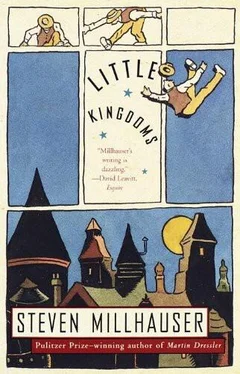CRIMINALS. Our torture chamber and prison cells lie in the cellars beneath the town hall. Some say that a passageway leads down to a dungeon, which lies at the same depth as the dungeon of the castle on the other side of the river, but there is no evidence whatever for such a dungeon, which moreover would be entirely superfluous, since our prisons are used solely for detention during trial. It is impossible to know whether our legendary dungeon gave rise to the tale of the castle dungeon or whether the castle dungeon, in which we both do and do not believe, gave rise to ours. Our torturers are skilled craftsmen, and our laws are severe. Murderers, traitors, rapists, thieves, adulterers, sodomites, and wizards are taken in a cart to the executioner’s meadow beyond the walls and there hanged, beheaded, burned at the stake, drowned, or broken on the wheel by the public executioner in full view of citizens and nearby villagers who gather to witness the event and to eat sausages sold at butchers’ stalls. The peasants say that the seed of criminals buried in the graveyard gives birth to the race of dwarfs. The rigor of our laws, the skill of our torturers, and the threats of our preachers, who paint the torments of hell in lifelike detail worthy of our artists and engravers, are intended to frighten our townsfolk from committing criminal deeds and even from having criminal thoughts, and in this they are largely but not entirely successful. The depravity of human nature is a common explanation for this partial failure, but it is possible to wonder whether our criminals, who are tortured underground and executed outside our walls, are not secretly attracted to all that is beneath and outside the world enclosed by our walls — whether they do not, in some measure, represent a restlessness in the town, a desire for the unknown, a longing to exceed all that hems in and binds down, like the thick walls, the heavy gates, the well-made locks and door panels. It is perhaps for this reason that our laws are severe and our instruments of torture ingenious and well crafted: we fear our criminals because they reveal to us our desire for something we dare not imagine and cannot name.
A CHANGE OF HEART. The margrave was tortured on two separate occasions, on the second of which the bones of both arms and legs were broken, but he did not confess his crime, and at length he was carried unconscious down to the dungeon and flung onto a bed of straw. Some members of the court were surprised by the leniency of the punishment, for committing adultery with the wife of a prince was considered an act of treachery and was punishable by emasculation, followed by drawing and quartering, but others saw in the margrave’s fate a far worse punishment than death: a lingering lifetime of lying in darkness, sustained only by sufficient nourishment to keep one sensible of one’s misery, while disease and madness gradually destroyed the body and the soul. The dwarf, who had advised death by beheading, a punishment reserved for rapists and sodomites, saw in the sentence a secret indecisiveness: the Prince did not entirely believe the confession of the Princess. Or, to put it more precisely, the Prince believed the confession of the Princess, but his belief had at its center a germ of doubt, which spread outward through his belief and infected it in every part with a suspicion of itself. The Princess, for her part, soon recovered from her fever, and resumed her former habits; only, there was a marked reserve about her, and sometimes she would break off in the middle of a sentence and grow silent, and seem to gaze inward. She no longer summoned the dwarf, and indeed appeared to avoid his company; but Scarbo well understood the necessity for his banishment, for had he not caused her to fall beneath her high estimate of herself? The Prince, uneasily reconciled with his wife, sensed in her an inner distance that he could not overcome; to his surprise, he discovered that he did not always wish to overcome it. To the extent that he believed her confession, he felt a cold revulsion that she had lain with the margrave, even at his own urging; to the extent that he disbelieved her confession, he blamed her for condemning the margrave to a dungeon death. Meanwhile the Princess withdrew deeper and deeper into her inner castle, where she brooded over the events that had estranged her from the Prince, and made her a stranger even to herself. And as the days passed, a change came over her. For she saw, with ever-increasing clearness, in the long nights when she no longer slept, that the Prince had wronged her, by sending her to the bed of the margrave; and she saw, with equal clearness, that she had horribly wronged the margrave, by her foul lies. Then in the dark the Princess vowed to set right the wrong she had done him. And she who had lain coldly in the bed of the margrave, brooding over the displeasure of the Prince, now looked at the Prince strangely, as at someone she had known long ago; and lying coldly in the bed of the Prince, or lying alone in her private bedchamber high in her tower, she thought of the margrave, in the bowels of the earth, deep down.
WIVES. No burgher or artisan can manage the complex affairs of his household without the aid of his capable wife. The wives of our town are practical and industrious; on the way to market in the morning they walk purposefully, with powerful strides. It is true that our husbands, while admiring their wives, expect them to be obedient. A wife who disobeys her husband will be promptly chastised; if she provokes him by continued disobedience, he has the right to strike her with his fist. Once, when a young bride of high beauty and strong temperament argued with her patrician husband in the presence of dinner guests, he rose from the table and in full view of the company struck her in the face, breaking her nose and disfiguring her for life. A wife’s conduct is carefully regulated by law; it is illegal for a wife to permit a servant to place a brooch on her bosom, for no one may touch her on the breast except her husband. The wives of our town are strong, efficient, and never idle. They are fully able to manage a husband’s affairs if he should depart from town on business, or his trade if he should die. The wives make up the morning fires, shake out rugs and clothes, tend their gardens, direct their servants to prepare dinner. Only sometimes, resting by a window or pausing beside a well, a change comes over them. Then their eyes half close, a heaviness as of sleep seems to fall on their shoulders, and for a moment they are lost in dream, like children listening to stories by the chimney fire, before they return to their skins with a start.
A MEETING. One morning Scarbo received by messenger a summons from the Princess. He had not exchanged a single word with her since her illness, and he appeared promptly at the bower, shutting the wicker gate behind him and entering the shady enclosure with a low bow. The Princess sat on one of the crimson silk couches and motioned for him to sit opposite. Scarbo was struck by something in her manner: she had about her a self-command, as if she were a tensely drawn bow, and she looked at him frankly, without hostility but without friendliness. As soon as he was seated she said that she wished to ask a difficult service of him. The request itself would put her at his mercy, and she had no illusions concerning his good will toward her; but since she no longer valued her life, save as a means to one end, she did not care whether he betrayed her. The dwarf, instantly alert to the danger of the interview, as well as to the possibility of increasing his power in the court, chose not to defend his good will, but remained warily silent, only lowering his eyes for a moment in order to display to the Princess his distress at the harshness and unfairness of her remark. The Princess spoke firmly and without hesitation. She said that because of her weak and evil nature, a nature abetted by dubious councillors in the service of one who no longer wished her well, she had wronged the margrave, who now lay suffering a horrible and unjust fate; and that she was determined to right her wrong, or die. In this quest she had decided, after long thought, to ask the help of the dwarf, knowing full well that by doing so she was placing herself in his power. And yet there was no one else she could turn to. He was intimate with the Prince, adept at hiding and spying, and, as she well knew, at insinuating himself into the confidence of those he served; moreover, it was he alone whom the Prince entrusted with the task of descending the legendary stairway with the prisoner’s daily ration of wretched food, which he placed in the hands of the keeper of the dungeon. The service she requested of the dwarf was this: to arrange for the margrave’s escape. In making her request, she understood perfectly that she was asking him to put his life at risk by betraying the Prince; and yet she was bold enough to hope that the risk would be outweighed by the gratitude of the Princess, and the advantage of having her in his power. Here she paused and awaited his answer.
Читать дальше












